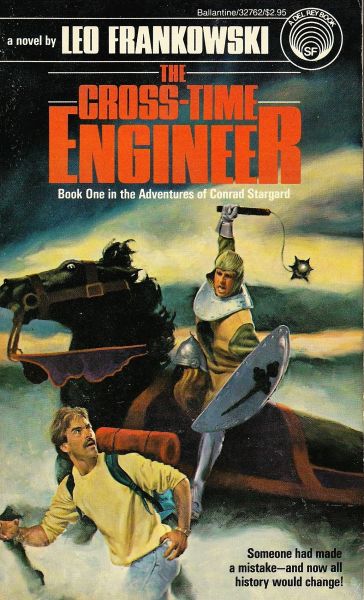Because I Was Paid
The Cross-Time Engineer (Adventures of Conrad Stargard, volume 1)
By Leo Frankowski

12 Dec, 2023
1986’s The Cross-Time Engineer is the volume that launched Leo Frankowski’s increasingly dire Adventures of Conrad Stargard, a Morganade1 adventure series on a long-suffering world.
Hungover, Conrad Schwartz sets out on an ill-fated hike. One temporal mishap later and the American-trained Polish engineer found himself somewhere he only knew from text-books.
Or rather, somewhen.
It takes some time for the penny to drop, but eventually Conrad grasps that he has not wandered into a community of particularly diligent historical cosplayers. Somehow, he has been transported from the Poland of 198x to the Poland of 1231. This is unwelcome news for many reasons, not least of which is the fact that the first of several Mongol invasions of Poland is just ten years away.
Many accidental time travelers in Conrad’s position would have fled to some more advanced (and less open to invasion by the Mongols) part of Europe. Filled with the unbounded confidence of an engineer, Conrad renames himself Conrad Stargard (his actual surname being one that Poles would find suspicious) and sets out to modernize Poland in time to repel the Mongol invaders.
Conrad’s task is a monumental one. 13th century Poland is a disunited land, each of its lords more concerned with preserving their own status than protecting Poland as a whole. Indeed, many of them may not think of Poland as a whole. Additionally, the industrial and technological base available is negligible.
Were his goals not sufficiently imposing, Conrad’s personal resources are unimpressive. He has his engineering skill, and thanks to the active intervention of the distantly related time traveler who has adopted Conrad as a special project, an incredibly sharp sword and what amounts to a magic horse. Aside from the sword, the horse, the ongoing help of the representative of a nigh-godlike temporal agency, the alliance with virtually every decent Pole he meets, from saintly hermit Father Ignacy to Duke Henryk the Bearded himself, a seemingly endless supply of fourteen-year-old girls who totally look like they are sixteen, and the material resources made available by his rocket-propelled ascent through Polish social ranks, Conrad has virtually nothing with which to transform Poland.
Will Conrad end his days feathered with Mongol arrows? Or can one engineer backed only by an author in complete control of every element of the ludicrous plot somehow prevail?
~oOo~
It is somewhat optimistic of Conrad to think he will live long enough that he needs to worry about events ten years down the line. The 13th century was not a lifespan-friendly period and it would only get worse.
These days Frankowski may be best remembered for a memorable essay on why he moved to Russia (short version: Russian women were so economically desperate that their standards were low enough for him to find a bride — at least until his money ran out) and for providing proof that it was possible to write a book so terrible even Baen would turn it down2. In his day, however, Frankowski was a respected author of awfully popular … well awful but popular, at any rate … books, easily the equal of Lionel Fanthorpe or Charles R. Tanner3.
I could find no fault with the author’s spelling or the binding of the Del Rey edition, and the prose is no worse than a lot of other SF novels of this era. That’s pretty much the end of the positive qualities of the novel, save for a very important one I will discuss later. The flaws abound, from the greased rails to success on which the hero rides, to the author’s egregiously sexist views on women in general and teenaged girls in particular4, to his historical liberties5. This is a wretched novel. The fact that The Cross-Time Engineer is terrible is completely irrelevant to its success.
The one thing the book does well, the reason none of its flaws mattered to the bottom line, the same reason certain other books have thrived despite being shit, is that it appeals to its specific target demographic very effectively. There exists (or existed, anyway) a market for novels in which men easily overcome every obstacle in their path while boning a nigh-infinite number of teens6. As long as Frankowski hit the right notes, offered losers hope that they too could be popular, rich, significant, and drowning in schoolgirl pussy given only a single miraculous event, other issues did not matter to his fan base. The moral is “know your audience.”
I could not find in-print editions of this specific book at any respectable bookseller. People are free to add helpful links in comments on the understanding that I will then delete said links.
1: After Mark Twain’s A Connecticut Yankee in King Arthur’s Court. There didn’t seem to be a name for this subgenre so I invented one.
2: Generally speaking, Baen (like other publishers) punts authors for insufficient sales. Conversely, pretty much every publisher is able to hold their nose no matter how terrible the book (or its author) if the book in question sells well.
3: Yeah, I’m not bothering with links for those. Have fun researching them.
4: Especially alarming when you remember Frankowski’s pay-for-play marriage included a teenaged step-daughter.
5: In particular, Frankowski credits Mongol success to their endless hordes. In fact, the Mongols were vastly outnumbered but they used their resources far more effectively than the defenders. No special shame to the Poles, as kicking the asses of much larger forces was a Mongol specialty at this time. However, it’s a bit humiliating to admit that one was curb-stomped repeatedly by a numerically inferior, militarily superior force, thus the little white lie about comparative numbers.
6: Mostly willing, even.
